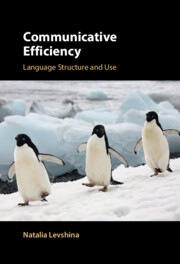Book contents
- Communicative Efficiency
- Communicative Efficiency
- Copyright page
- Dedication
- Contents
- Figures
- Tables
- Preface
- Acknowledgements
- Abbreviations
- Part I Different Types of Efficiency in Language
- 1 Communicative Efficiency
- 2 Efficiency and Formal Length
- 3 Efficiency and the Order of Meaningful Elements
- 4 Other Ways of Saving Effort
- Part II Efficiency and Language Evolution
- Part III Case Studies
- Appendices
- References
- Index
3 - Efficiency and the Order of Meaningful Elements
from Part I - Different Types of Efficiency in Language
Published online by Cambridge University Press: 03 November 2022
- Communicative Efficiency
- Communicative Efficiency
- Copyright page
- Dedication
- Contents
- Figures
- Tables
- Preface
- Acknowledgements
- Abbreviations
- Part I Different Types of Efficiency in Language
- 1 Communicative Efficiency
- 2 Efficiency and Formal Length
- 3 Efficiency and the Order of Meaningful Elements
- 4 Other Ways of Saving Effort
- Part II Efficiency and Language Evolution
- Part III Case Studies
- Appendices
- References
- Index
Summary
In this chapter I discuss different criteria and strategies related to the order of words, morphemes and syntactic constituents. There are very many theories, especially in psycholinguistics, which argue for some word orders being more costly than others. I argue that different ways of minimizing processing costs can be interpreted as maximization of accessibility, according to the general principles introduced in Chapter 1. First, I discuss which factors can, according to different researchers, make word order more or less costly, based on the existing evidence. Next, I provide well-known examples of efficiency and discuss competing explanations. The strategies include minimization of dependency distances and syntactic domains, putting Subject first, using a specific order of noun phrase elements and morphemes, Greenbergian word order correlations and avoidance of crossing dependencies, which can be explained by the preference for continuous constituents.
Keywords
- Type
- Chapter
- Information
- Communicative EfficiencyLanguage Structure and Use, pp. 66 - 94Publisher: Cambridge University PressPrint publication year: 2022

